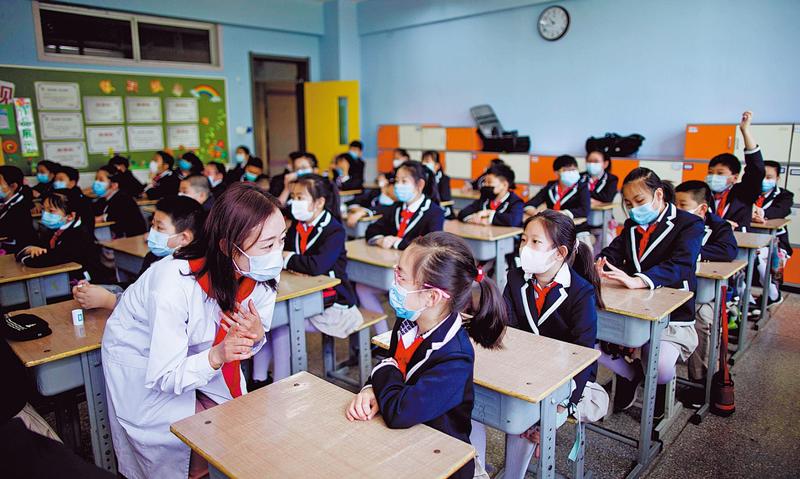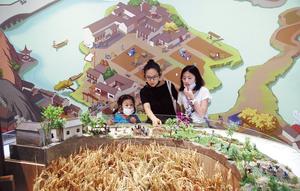Pandemic provides opportunity for parents to help children cope with the awareness of mortality and manage their emotions, Li Yingxue reports.
 A medical worker who returned from Wuhan after supporting the fight against the COVID-19 pandemic tutors a student about anti-virus knowledge in a class in Xinjianlu primary school, Taiyuan, Shanxi province, on May 18. (PHOTO / CHINA NEWS SERVICE)
A medical worker who returned from Wuhan after supporting the fight against the COVID-19 pandemic tutors a student about anti-virus knowledge in a class in Xinjianlu primary school, Taiyuan, Shanxi province, on May 18. (PHOTO / CHINA NEWS SERVICE)
In February, Wu Qi, associate editor-in-chief of Sanlian Life Week, posted a handwritten mind map on Sina Weibo, sharing with her young daughter how she deals with misfortune.
She told her daughter how to face a problem and how to manage emotions in different steps.
Wu returned to her hometown Wuhan, capital of Hubei province, to celebrate Chinese New Year on Jan 17. Four days later, she moved to a hotel next to Wuhan Jinyintan Hospital together with two colleagues, from where they reported on the fight against the novel coronavirus for the next three months.
Her mind map outlined to her daughter how Wu faced the psychological challenges she encountered and how she managed the accompanying emotions.
According to Huang Zheng, associate professor at the Institute of Psychology, Chinese Academy of Sciences, for parents who communicate with their children well in daily life, the extra hours and days spent with their kids due to the suspending of economic activities and the closing of schools have strengthened their relationships.
"But for those who already have friction with their children, or teenagers who are in their rebellious phase, the relationship might be more intense," Huang says.
Huang says Wu's mind map is a useful way to communicate with children how to understand and manage emotions and similar to the social and emotional learning course taught in schools and kindergartens.
"It's necessary to teach children how to manage their emotions, which can also be done through reading related picture books or stories," she says.
But, she says, the frequency should not be too much, lest it overwhelms children.
Huang says children may get curious and scared when they hear about the virus and that COVID-19 kills people, but says: "Parents should not avoid these questions about life and death, as learning about death is compulsory for everyone."
According to Huang, children usually become aware of death at the age of 4 or 5, "much earlier than parents think".
"If they have pets that die or relatives pass away, they may realize the existence of death more directly, and furthermore, they might worry death could happen to them," Huang says.
Huang says if a child asks about death due to the pandemic, it's a good time to discuss the topic with them because it shows the child's interest, otherwise there is no need to bring up the topic.
"Life education is combined with experience, when they ask, it means they are emotionally prepared, whether curious or fearful, the emotion will make sure the knowledge they learn is not just cold concepts but an experience connected with emotions," Huang explains.
For children of different age groups, Huang thinks parents should use slightly different ways to talk to them about death.
"For preschool children, a psychological barrier needs to be built between them and death," Huang says. "They need to feel safe."
 A parent takes her children to Wuzhong Museum, which opened in Suzhou, Jiangsu province, in late June, on July 22. Many children are using the summer vacation to broaden their knowledge by visiting museums. (WANG JIANKANG / FOR CHINA DAILY)
A parent takes her children to Wuzhong Museum, which opened in Suzhou, Jiangsu province, in late June, on July 22. Many children are using the summer vacation to broaden their knowledge by visiting museums. (WANG JIANKANG / FOR CHINA DAILY)
Children's fear of death won't be eased in one go and the key to reassuring children is for parents to answer their kids' questions with a calm attitude each time.
"If the parents are impatient or reject the questions, the attitude will transfer the parents' fear more directly than words."
For school-age children, Huang recommends parents have a sincere discussion with them, and search for answers or information together with them in books or on the internet.
For teenagers, some may be overly defensive against death, denying the possibility of any personal danger, although they are told certain behavior such as smoking or drinking may harm them.
Huang says for teenagers, parents should emphasize the danger of the pandemic and ask them to pay attention to the epidemic prevention measures.
"It's not horrible to talk about death. Children at any age may have questions about life and death, and the parents should answer them patiently," Huang says. "It's not good for children to reject the topic of death."
Lin Chun, deputy director of psychological consultant working committee of Chinese Psychological Society, says besides offering the chance for parents to talk to their children about death, the pandemic has also given parents an opportunity to cultivate their children's ability to deal with a crisis.
He says it's normal for people to be afraid and anxious because of the uncertainty of the pandemic, and both feelings have a positive side of keeping people alert to danger.
"If the kids are anxious, parents could guide them to embrace their emotions and learn scientific epidemic prevention methods to reduce their fear," Lin says.
Lin says information overload is a problem people are facing when learning about the pandemic. He encourages parents to search for accurate and useful information together with their children.
The pandemic is something that both parents and kids want to know about, so it's a good time for parents to inform themselves while helping their kids to figure out how to find accurate information amid all the online messages.
One way to do that is to contrast the information from medical professionals or authoritative institutions such as the WHO and articles on other websites, which will reveal how some reports or rumor-mongers sensationalize or misrepresent the situation to gain attention.
"Critical thinking is needed, and we can use the pandemic to train children to always question the information they receive," Lin says.
Some news reports and science popularization materials can also inspire kids to imagine and feel the vulnerability of life and the anguish of disease, which lets them understand the importance of health and the inevitability of death.
Lin also says parents can learn more about the virus with their kids, such as the routes of transmission, how the virus infects the cells, and the relationship between such pathogens and wild animals and why climate change is increasing the risk of such viruses emerging.
"By telling them that human's knowledge is still limited which needs scientists to explore further can also trigger the kids' curiosity about nature and their interest in science," Lin says.
Children may not be used to the lack of outdoor activities and playing with their peers, and Lin says the pandemic is also an opportunity to discuss with children the importance of society.
"Parents could tell the kids that because of the medical workers' round-the-clock efforts, patients were saved and recovered, and the pandemic has been controlled because of the front line epidemic prevention personnel, together with people from other professions, and by the rest of us staying home," he says.
As the summer vacation has arrived and the pandemic is basically under control in China, Lin encourages parents to create more opportunities for their children to communicate with their friends.
"There are many things the children can only learn from each other, even from fighting with each other, so social contact with their peers is necessary," Lin says.
"Children should not only communicate through the internet. Families can socialize together."
Lin says there are multiple roles that parents play besides being an educator, and the pandemic has strengthened those roles because of the time spent with the children.
"Parents should also be good observers, companions, demonstrators and leaders," Lin says.
Contact the writer at liyingxue@chinadaily.com.cn


